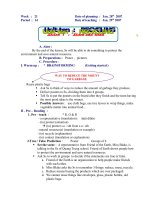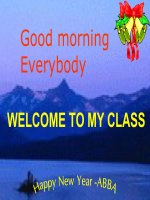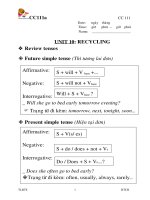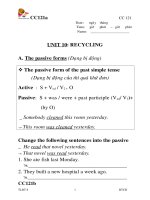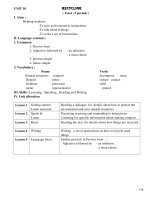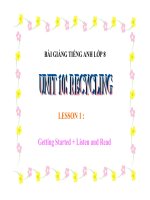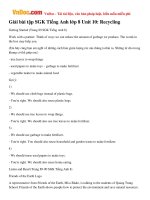Unit 10: Recycling
Bạn đang xem bản rút gọn của tài liệu. Xem và tải ngay bản đầy đủ của tài liệu tại đây (368.93 KB, 19 trang )
Week : 21 Date of planning : Jan. 28
th
2007
Period : 61 Date of teaching : Jan. 29
th
2007
A.
A. Aims :
By the end of the lesson, Ss will be able to do something to protect the
environment and save natural resources.
B. Preparations : Poster , pictures
C. Procedure :
I. Warm up : * BRAINSTORMING (Getting started )
Reuse plastic bags
Ask Ss to think of ways to reduce the amount of garbage they produce.
Deliver posters to Ss, dividing them into 4 groups.
Tell Ss to put the posters on the board after they finish and the team having
the most good ideas is the winner.
Possible Answers : use cloth bags, use tree leaves to wrap things, make
vegetable matter into animal food...
II . Pre – Reading :
1. Pre – teach : * R. O & R
- a representative (translation) : âaûi diãûn
- (to) protect (situation)
(to) protect s.o / sth from s.o / sth
- natural resource(s) (translation or example)
- (to) recycle (explanation)
- (to) contact (translation or explanation)
2.True / False Prediction : Poster Groups of 4
Set the scene : A representative from Friend of the Earth, Miss Blake, is
talking to the Ss of Quang Trung school. Friend of Earth shows people how to
protect the environment and save natural resources.
Ask Ss to work in groups to decide if the statements are true or false.
a. Friend of the Earth is an organization to help people make friends with
each other.
b. Miss Blake asks the Ss to remember 3 things: reduce, reuse, recycle.
c. Reduce means buying the products which are over packaged.
d. We cannot reuse things like envelopes, glass, plastic bottles, old plastic
bags.
Lesson 1 : Listen and
Read
WAY TO REDUCE THE MOUNT
OF GARBAGE
e. Miss Blake says that we should use cloth bags and shouldn’t use plastic
bags at all.
f. Recycling means not just throwing things away but trying and finding
another use for them .
Feedback 1 : T. has Three groups go to the BB to write their predictions .
III. While – Reading : B. opened .
1. Feedback 2 :
Ask Ss to open their books, listen to the tape while reading the dialogue.
Call on Ss to correct the false statements.
Answers :
a. False an organization to help people protect the environment and
save natural resources.
b. True
c. False reduce means not buying...
d. False We can reuse things...
e. True. f. True
2. Comprehension Questions : * LUCKY NUMBER Poster
Ask Ss to look at the questions on poster
Questions :
a. What does Miss Blake mean by reduce ? ( It means not buying
products which are over packaged .
b. What things can we reuse ? ( envelopes , glass , plastic bottles and old
plastic bags )
c. What does recycle mean ? ( It means not to throw things away . Try
and find another use for them . )
d. Where can we look for information on recycling things ? ( by having
contact an organization like Friends of the Earth , going to the local
library , or asking our family and friends .
e. Why does Miss Blake tell Lan that we shouldn’t use plastic bags at
all ? ( Because plastic bags can’t be reused as many times as cloth or
paper bags )
Lucky number :
IV. Post - Reading : * DISCUSSION :
T. asks Ss to tell her how to protect our environment .
Ask Ss to express their opinions / ideas on this topic.
Give feedback correct and have Ss copy :
V. Homework :
Write the questions and full answers in your exercise notebook.
Do the exercise 1, 2 (workbook -page 59).
Use banana to wrap food Reuse and recycle bottles and cans
Put garbage bins around the schoolyard
Not throw trash on the water Use fewer plastic bags .
Week : 21 Date of planning : Jan. 28
th
2007
Period : 62 Date of teaching : Jan. 31
st
2007
B.
A. Aims :
By the end of the lesson, Ss will be able to practice in giving and
responding to instructions.
B. Preparations : Poster , pictures
C. Procedure :
I. Warm up : * KIM’S GAME
Show the picture on page 91 to the Ss and
ask them to observe it carefully, let them
look at the picture for about 2’’ then put
it away.
Divide the class into 4 teams.
Ask Ss (one each S in each team at a time)
to go to the board and write as many words
showing things in the picture as possible.
Tell Ss the team with the most right words
is the winner.
II. Pre – Speaking :
1. Pre – teach : * R. O & R
- fertilizer (exllanation) : phân bón hoá học
(to) fertilize
- compost ( situation) : phán xanh
a compost heap
- fabric (realia) : vaíi, såüi
- leather (situation) : da thuộc
2. Dictation List :
Draw the table on the board and ask Ss to copy it.
Tell Ss to listen to the words and put them in the right columns.
Model some words.
Read the words (in the table below) aloud, slowly and jumble them up.
After listening, ask Ss to work in pairs and give their answers.
-Read the words again and correct.
The table (with answer Keys)
Lesson 2 : Speak
* Answer Key : used paper,
old newspapers, books,
cardboard boxes, bottles,
glasses, jars, plastic bags,
food cans, drinking tins,
vegetable matter, clothes,
shoes, school bags, waste
paper...
III. While – Speaking :
1.Mapped Dialogue :
Put the mapped dialogue chart on the board.
GROUP ITEMS
Paper used paper, old newspaper, books, cardboard boxes
glass bottles, lasses, jars
plastic plastic bags, plastic bottles
fabric clothes, cloth bags, material
metal food cans, drinking tins
leather shoes, sandals, school bags
Vegetable
fruit peels, vegetables, rotten fruits
Elicit the exchanges from Ss.
Have some pairs practice each exchange before going on to another
exchange.
After finishing the dialogue, ask a good pair to demonstrate the
whole dialogue.
Ask Ss to work in pairs, replacing the information(in brackets) with
the words in the dictation list.
IV. At home : Practice the dialogue in pairs .
Week : 21 Date of planning : Jan. 28
th
2007
Period : 63 Date of teaching : Feb. 2
nd
2007
C.
A. Aims :
By the end of the lesson, Ss will be able to listen for specic information
about making compost .
B. Preparations : Poster , pictures
C. Procedure :
I. Warm up : * BINGO
II. Pre – listening : Poster Groups of 5
Set the scene : You will hear a passage about making compost . Before
listening , you can guess which answer are right .
MAPPED DIALOGUE
Lesson 3 :
Listen
used paper, old newspapers, books, cardboard boxes, bottles,
glasses, jars, plastic bags, food cans, drinking tins, vegetable
matter, clothes, shoes, school bags, waste paper
Ask Ss to open their books and read the multiple choice questions on
poster .
Check if Ss understand the questions.
Feedback 1 : three groups go to the BB to write their prediction
III. While – listening :
Feedback 2 : T. asks Ss to listen to the tape ( 3 times ) to check the
correct answer .
Have Ss give their answers and correct .
Answer Key : a.A b.B c.B d.B
Content of listening :
Groups a b c d
G1
G2
G3
What type of garba
LISTEN
III.Post-Speaking : Multiple Choice
-
-Play te tape 2 or 3 times,Ss listen & do theEx.
-Have Ss give their answers and co
:
I.Check up :
-Ask some questions about reduce,
reuse, recycle.
II.Warm up : Kim’s Game
-Show the picture on page 91 to the Ss
and ask them to observe it carefully, let
them look at the picture for about 2’’
then put it away.
-Divide the class into 2 teams.
-Ask Ss (one each S in each team at a
time) to go to the board and write as
many words showing things in the
picture as possible.
-Tell Ss the team with the most right
words is the winner.
SPEAK
I.Pre-Speaking :
1.Pre-teach :
-fertilizer (exllanation) : phán boïn hoaï
hoüc
(to) fertilize
-compost ( situation) : phán xanh
a compost heap
-fabric (realia) : vaíi, såüi
-leather (situation) : da thuäüc
*Checking Vocab : Bingo
-Get Ss to brainstorm a list of about 10
new words : fertilizer, compost, leather,
-Look at the picture for 2”.Write the words
you see in the picture.
Team A : white chalk
Team B : blue chalk
-Farmers often use this thing to make their
plants or trees grow well.
-What do you call the fertilizer made from
spoiled food, leaves, vegetable matter...?
-What are these clothes made of ?
-Our shoes, sandals, bags...are often made
of...?
-you are going to listen to the words for
